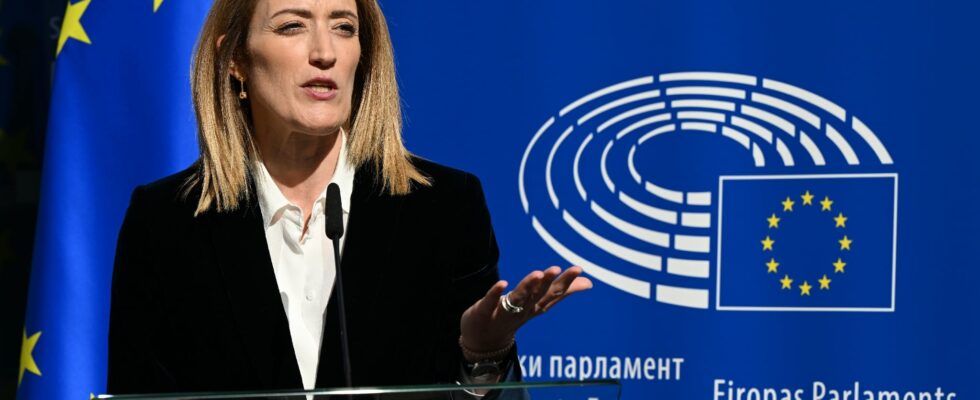The European elections last June have recomposed the political balances within the European Parliament. The breakthrough of the sovereignist and populist right illustrates this. The new parliamentary group Patriots for Europe formed by Viktor Orban, composed of the National Rally and the Hungarian party Fidesz, becomes the third force in the assembly with 84 seats.
The European Conservatives and Reformists (ECR) have gained ten seats compared to the previous legislature, when they held 68. Finally, the German far-right party Alternativ für Deutschland (AfD) has created a new parliamentary group. The latter, Europe of Sovereign Nations, has 25 seats, 14 of which are held by Germans from the AfD. Between the 2019 and 2024 elections, this hard right has increased from 120 to 187 MEPs.
In the previous legislature, the European People’s Party (EPP), the largest parliamentary force in the chamber with 188 seats, looked more to its left to obtain text majorities. While the Progressive Alliance of Socialists and Democrats (S&D) retained 136 seats and, at the same time, the status of second largest force in the chamber, the centrists of the group Renew lost 25 MEPs out of the 101 they had. The same goes for the Greens, who now have only 53 seats, instead of 72 in the previous legislature.
In these circumstances, what future for the projects that could not go through to the end of the legislative process, interrupted by the need to reconstitute a new assembly? Ursula Von der Leyen (EPP), who made her “breakthrough on the European scene with the Green Deal” in the words of Hans Stark (a specialist in Franco-German relations), will she have the same ecological considerations in a chamber where the Green parliamentary group is weakened? Will the collusion with Putin of the political parties that make up the newborn Patriots of Europe not be the reason for certain measures related to defense? Will this hard protectionist right prevent the liberal economic policies led by the President of the European Commission? Overview.
Nature Restoration Act
Presented to the Commission in June 2022, the law on the restoration of nature provides for “restore at least 20% of EU land and sea by 2030 and all ecosystems in need of restoration by 2050.” Faced with significant opposition from the agricultural sector, the European Parliament and the Council of the European Union – the two legislative bodies – managed to agree on a watered-down text.
Despite the compromises, this agreement was short-lived since Hungary finally withdrew from the EU Council, which has a representative from each member state. However, without a compromise, the text could not continue its legislative process. Especially since, as the media Euractiv notes, Hungary did not make a counter-proposal. This suggests a position of “ideological opposition”. Even if an agreement is finally reached, the new version would have to go back before the European Parliament. But due to its new composition, there is no indication that this bill will be adopted.
The Defense Investment Program (EDIP)
While defence policy projects usually go directly through the EU Council, the Edip is an exception to the rule. This text must in fact be submitted to MEPs who must give their green light, as is the case for industrial policy projects.
In detail, the Edip includes an allocation of 1.5 billion euros to fund a plan that extends until 2027. The objective is to support the arms industry while continuing to make group purchases of arms. This plan is intended to be more elaborate than the “numerous other short-term emergency initiatives“.
Presented in the fall of 2023, having been delayed due to the sensitivity of the subject, the question now arises of its legislative path under the new assembly. It is impossible at this stage to know whether the project will only go through the Security and Defense Committee or whether it will be presented before the Industry and Internal Market Committees. Opposition could come from right-wing nationalists, in favor of Putin’s dictatorship. But also from the left, because many of the manifestos of these political parties demand the reduction of funds allocated to defense.
The relaunch of the Capital Markets Union (CMU)
The Capital Markets Union is a 10-year-old initiative. Proposed by Jean-Claude Junckers, then President of the European Commission, the measure was supposed to finalise the union of the European banking market. Its implementation would allow the contribution of 2,000 billion euros more on European capital markets.
Discussions on the need for its finalisation returned last April. The reason: “an increasingly broad consensus on the crucial importance of private investment flows to meet the financing needs of the Union” according to Euractivon issues of decarbonization and digital transition.
Once again, the hand will be in the hands of the new legislature. During a meeting with the Medef, Jordan Bardella had declared himself open to discussing common harmonization rules concerning the union of the capital markets in Europe. Surprising from someone who had previously opposed the idea of the single European market.
Other projects
Finally, the new legislature leaves doubts hanging over the authorisation of the use of new genomic techniques (NGT) in agriculture. The text was to be returned to the European Parliament after being amended by the Council of the EU, where there are still blockages over the issues of traceability and labelling of products.
A whole section on corruption will also be studied by the new assembly. The measures follow the Qatargate scandal. Announced in December 2023, a new directive is designed to “require that interest and lobbying groups financed by non-EU state actors register on a transparency register”, according to EuractivThe survival of this measure is jeopardized by the presence in the hemicycle of MEPs from the National Rally and Fidesz. These two parties, given their past with the Kremlin, risk not looking favorably on this measure which is a matter of democratic health.
